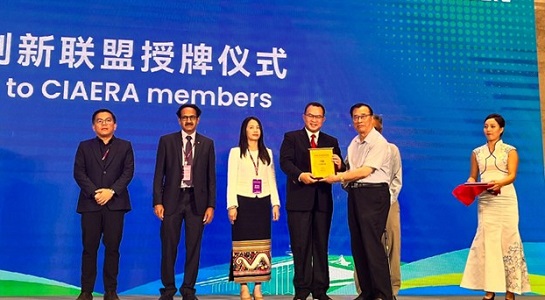IPB University Rector Introduces ‘Techno-Sociopreneurship’ to Asian Higher Education Consortium in Hainan, China

IPB University participated in the establishment of the Consortium for Innovations in Agricultural Education and Research in Asia (CIAERA) and the Asia Hub Annual Meeting 2023 in Sanya, Hainan, China (15-20/7). On the occasion, Rector of IPB University, Prof Arif Satria was invited to deliver a keynote speech on 'Asia Agriculture Dialogue on Post-pandemic International Collaborations in Research and Education in The New Era'.
"The multi-faceted challenges faced by the world, such as the COVID-19 pandemic, climate change, industrial revolution 4.0 and multinational conflicts directly affect the food system. Universities in Asia, especially those based on agriculture, must change and respond appropriately to reduce the negative impact on food and agriculture production systems, distribution and supply chains," Prof Arif said.
In his presentation, he mentioned three key points that Asian agricultural universities must align with in responding to these challenges. These key points are having an education and research system that is transformative, resilient and sustainable.
"Every crisis should require us to produce innovations. However, innovation without good downstreaming also makes the campus just an ivory tower. Therefore, the concept of techno-sociopreneurship must be implemented," added the rector.
Prof Arif also introduced IPB University's learning as a Techno-sociopreneurial University in front of the rectors of leading agricultural universities in Asia. This step is IPB University's response to global challenges.
He explained that technopreneurship and sociopreneurship must rest on three keywords, namely research, innovation and entrepreneurship. Techno-preneurship refers to the type of entrepreneurship that utilises innovation for commercial activities to support industrialisation. On the other hand, sociopreneurship focuses on activities in the community, where university innovations contribute to community development.
"IPB University has built Science Techno Park as an effort to strengthen technopreneurship. From here, IPB University has succeeded in increasing the commercialisation of innovation by 35 per cent. In fact, some of IPB University's innovation products have been exported, such as Calina Papaya, PK-1 Pineapple, various tempeh and others," said Prof Arif.
Meanwhile, continued the rector, for sociopreneurship IPB University has assisted up to 4,200 villages in Indonesia. A number of villages have now also produced export products such as Garut coffee, chillies and planting media from Cipanas, Cianjur Regency.
Prof Arif also appreciated the formation of CIAERA initiated by Nanjing Agricultural University, China and the Asia Hub Annual Meeting held together with Michigan State University, USA along with local partner universities in China.
"There is no one approach that is suitable for solving all problems. Therefore, collaboration across countries and educational institutions is a must to solve the problems currently facing the world," he said.
Along with Prof Arif Satria, Prof Suryo Wiyono (Dean of the Faculty of Agriculture), Dr Eva Anggraini (Director of Global Connectivity) and Dr Azis Boing Sitanggang (Assistant Director of International Programme Services, Directorate of Global Connectivity) also delivered presentations in other sessions such as 'Session: Water, Energy and Food Security and Climate Change' and 'Session: Joint Education Innovations'.
Prof Iskandar Siregar, Vice Rector of IPB University for Global Connectivity, Collaboration and Alumni Relations who was also present at the event mentioned that this meeting was very important to increase the contribution and involvement of IPB University at the regional and global levels, especially to offer solutions related to food system transformation in the context of the water-energy-food-soil nexus. (*/Rz) (IAAS/RUM)



